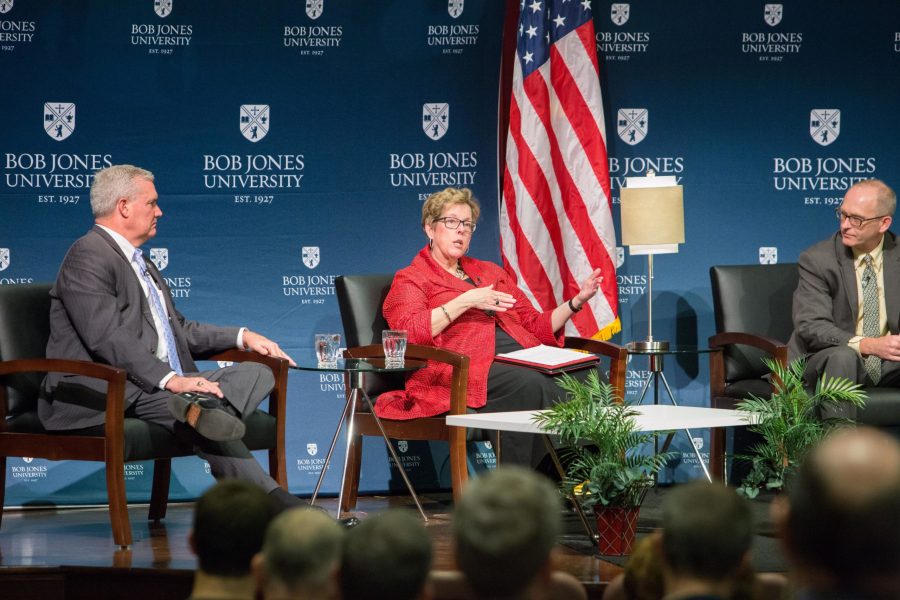BJU will hold a faculty forum aiming to answer the student body’s questions about the biblical view of identity in the modern world at 7 p.m. on Thursday in Stratton Hall.
Gary Weier, BJU’s provost and vice president for academic affairs, said the forum’s topic was chosen for its relevance to today’s culture. “I think identity is an issue that humans have always focused on,” he said. “The idea of who we are as humans is a perennial issue, but in today’s world, it is a key focus, and there’s a lot of societal pressure to think about it in certain ways.”
The event will begin with a 30-minute introduction to identity in a modern context. Dr. Brent Cook and Dr. Renton Rathbun, faculty members in the Division of Biblical Studies and Theology, will each give a brief presentation on the topic. Cook’s portion will focus on the ideas that led to the current cultural idea of self-identification, and Rathbun’s section will focus on a Christian response to these cultural conceptions.
Following the opening remarks, students will have the opportunity to ask Cook and Rathbun questions. Weier said the reason for using this format, as opposed to the panel discussions held last year, is to lay a clear foundation for thinking about the topic before engaging with students’ questions about the issue.
Cook believes the topic of the forum is fitting for students today. “Identity is the defining issue of our times,” he said. “Numerous historical and cultural factors produced our current identity crises.”
“We’re going to start with all the questions that are circulating in our culture—questions about race, gender, sexuality—but all of us face identity questions at some point in our lives, whether it’s in our vocations [or] in our marriages,” Cook said.
According to Rathbun, the purpose of the event is to provoke students to examine their own views on the subject and to challenge them to think biblically about identity. He believes that many young people have a distorted view of how their own identities should relate to Christianity, due to cultural pressures and weak, submissive authority figures.
Rathbun argues that people should find their identities in Christ, rather than in themselves, as has become common in modern culture.
“One of the things we want to get to is why it is that when young Christians are told to imitate Christ, that is the most unappealing thing someone could possibly say to them,” Rathbun said. “We’re going to say some things … to address the problem as it is, which is going to maybe be uncomfortable, which is good. People need to feel that because that’s what happens when you have real conversations.”
One of the focal points of the forum will be giving students actual answers to difficult questions, rather than dancing around the point, which Rathbun said is a common response in the Christian world to hard questions.
“[The person answering] either knows the answer and doesn’t want to say it or they just don’t know the answer, so then they just start saying spiritual things and never answer the question,” Rathbun said. “We want to avoid that and … get directly to the answer to the question in a biblical way and show how that works.”
In order to draw attention to the topic in the weeks before the forum, white posters with only the words “Who are you?” printed on them were placed in locations around campus, including outside the Den and in the Alumni Building.
According to Linda Abrams, a faculty member involved in planning the event, the posters are not intended to advertise for the event but rather to drive discussion. Although the posters have generated some curiosity among the student body, many students expressed their confusion as to the purpose of the posters.
Last week the posters were changed to include the date and location of the faculty forum, but the version still did not name the event.
“[Initially], these posters were pretty abstract, and really the reason behind that was to spark discussions,” Abrams said. “We want to get people thinking and curious to see if that sparks an interest in the topic, because the topic is really an important one.”


























































